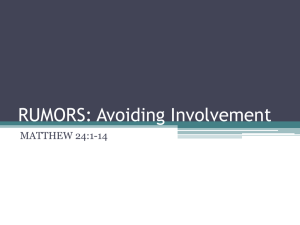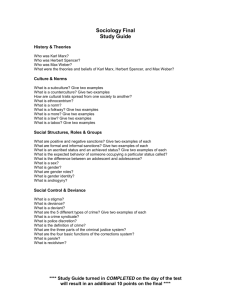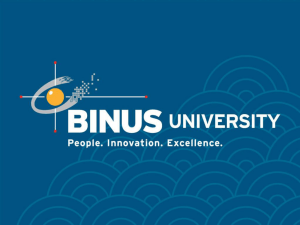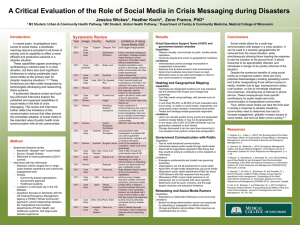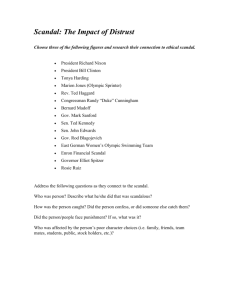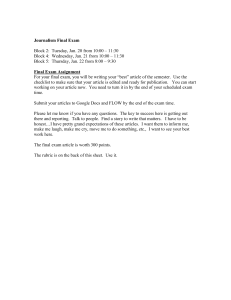COMP 2903 Course Overview
advertisement
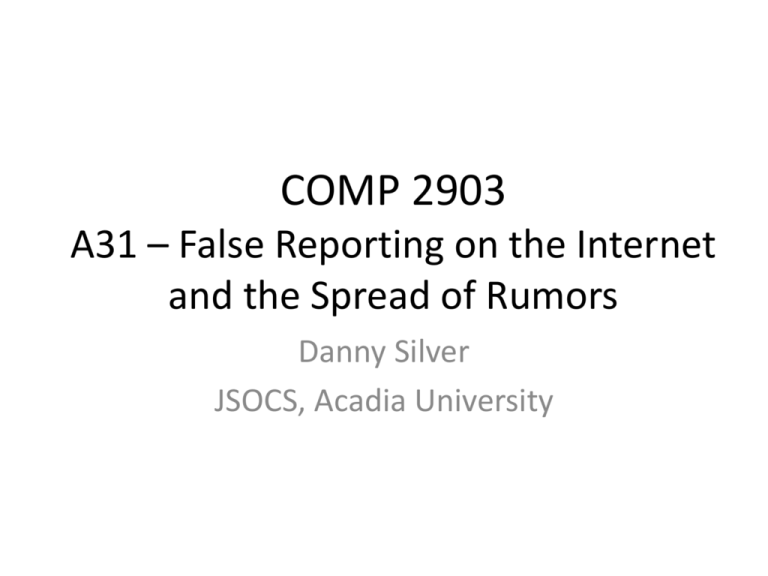
COMP 2903 A31 – False Reporting on the Internet and the Spread of Rumors Danny Silver JSOCS, Acadia University Paul Hitlin gnovis, April26, 2004 • B.A. Hampshire College in Amherst, Massachusetts. • M.A. from Georgetown University's Communication, Culture, and Technology program • gnovis is a peer-reviewed journal and academic blog run by graduate students in the Communication, Culture, and Technology program at Georgetown University • The Pew Research Center's Project for Excellence in Journalism (PEJ) dedicated to understanding the information revolution • Hitlin supervises PEJ's content coding operations, assists with the design of content analysis research, and helps to write the weekly New Media Index The Internet: The New Rumor Mill • Stephen O’Leary (2002): – “the social functions of rumor are virtually indistinguishable from the social functions of ‘real news’ … [people] are trying to make sense of their world” – Every medium of news has had a history of misreported stories – However, the internet allows a far greater number of persons to be involved in the production/ editing/dissemination of news Internet Errors Die Hard -1 • How are errors in Internet journalism corrected online? • Jim Hall (2001) feels they are not addressed properly – Errors are buried and never is really corrected – Because they propagate so rapidly – Interesting but erroneous story becomes folklore • This article examines Hall’s assertion, the reasons why Internet reporting leads to errors and 3 case studies Reasons for Cyberjournalism Errors 1. The need for speed – Always-on news means the new deadline is “now” – Timeliness trumps accuracy (Drudge Report) – Less time for fact-checking 2. Desire to attract website visitor “hits” – “News is infotainment” (Hall, 2001) – People can get there news from anywhere Reasons for Cyberjournalism Errors 3. Political Gains – Rumors are sometimes premeditated – To advance particular ideology 4. Attraction to Scandal – A report that a plane was brought down by a missle is more exciting than a mechanical failure – The spectacular catches reader attention – We all love a scandal Internet Errors Die Hard - 2 • The complete replacement of an erroneous story with a correct one is unique to electronic publication • Works only for those who come to the site after the correction – no audit trail, no notice of correction • “Social cacade” - an error can propagate quickly • Information can become entrenched even if it is incorrect - legitimacy through comm. and repetition • Online participants of new media are more likely to be influenced as compared to newspaper readers Three Case Studies 1. The Crash of TWA Flight 800 in 1996 2. Sidney Blumenthal versus Matt Drudge: Internet Libel 3. The Suicide of White House Aide Vince Foster !!! Break into teams and examine each of these. Conclusions • The Internet is a significant channel for rumors versus news • How can the positive democratizing aspects of the Internet be balanced with the potential for false reports and social cascades? • The most probable method is to promote the use of traditional standards of journalistic conduct (check the facts, ensure multiple sources) • Else reliability/quality of Internet will be questioned

